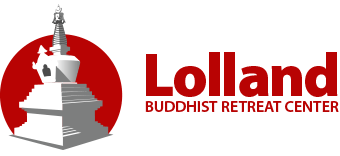Retreats
“Retreats help us hold the mind in one place. This makes focused work with the mind possible. One consciously sets aside the impressions and distractions of the outer world, and thereby becomes more aware of inner events. Gradually one learns not to react to inner disturbances, but rather to channel and work with them.”
– Lama Ole Nydahl
filler
Lolland Buddhist Retreat Center is a place where Diamond Way Buddhist practitioners can go deeper with their meditation for a longer period in the powerfield of the Stupa and peaceful surroundings. This is not to escape the everyday life, but to enhance development and qualities and to bring back to everyday life whatever good comes out of the retreat.
Development mainly happens through building up positive impressions in mind by meditation and meaningful action. Both is needed.
If you are newly interested in Buddhism, or just not yet up for the retreat, please feel very welcome to contact one of our Diamond Way Centers, which can give you possibility to incorporate meditation into your everyday life. You can also get some of the most basic information about Buddhism and learn about how to connect the Buddhist teachings with your life.
Daily meditation and retreats
The daily meditation is the most important practice. This is the way to work with our strong mental habits and regularly train the mind to focus towards its own nature. We do it in the same manner as we brush our teeth. To have this good habit of daily meditation can change the whole life for the benefit of all. A retreat can help us to train this seemingly simple action – to sit down and meditate, which later, in a busy everyday life, can be helpful.
In fact the daily practice is an ”inner retreat”, as we regularly focus on recognizing mind, instead of on outer or inner sensations that appear in mind. It is all about a shift of habits and focus. A retreat-place gives an outer frame to train the mind to become more stable in everyday life.
filler
filler
Coming to Lolland for a Retreat
Although each practitioner decides for himself/herself about the length and content of the retreat, it is very beneficial to ask the Lama for blessing, especially if it is for a longer period and when it is a ’closed retreat’.
Experienced practitioners and d.w.teachers can also advise you during your stay in the Lolland center.
Different types of retreats
Practice days: often friends come to Lolland together to meditate intensely and share time with one another between sessions.
Open retreat: for beginners open retreats make the most sense. You do four sessions of variable length per day. In the remaining time you can help out a bit in the center and share some time with the residents and other guests.
Closed retreat: during closed retreats one does not talk to others and one eats meals alone. This type of retreat is recommended only after you have a few years of experience with Diamond Way meditation, and have sought the advice of your lama.
Sangha retreat: as a Sangha-group from a Center you can stay for a weekend (or longer) to meditate and to spend time together, this can be very beneficial for the work together back in the Center
Let us know you are coming
To make sure there is available place for you, we need to know when you’d like to come.
Please contact us
how to get here
The few residents who are living here welcome you as “sangha who comes and goes”, to feel at home and if possible to help make the center function.
Please note
The Requirements for doing a retreat – that you are a Diamond Way practitioner, that you have taken Buddhist refuge from one of our teachers and that you do have a Diamond Way meditation practice.
To get the most out of your time here it is recommended that you don’t leave the site during your retreat. Anyway, if you would like to have vacation in the surrounding area, you are welcome to take nearby bed-and-breakfast and take part in our evening meditations only.
Parents can use children-area facilities – playroom, playground and family rooms – which are kept separated from the retreat- and meditation-area to make sure the practitioners are actually in an environment with as little outer imprints as possible.

